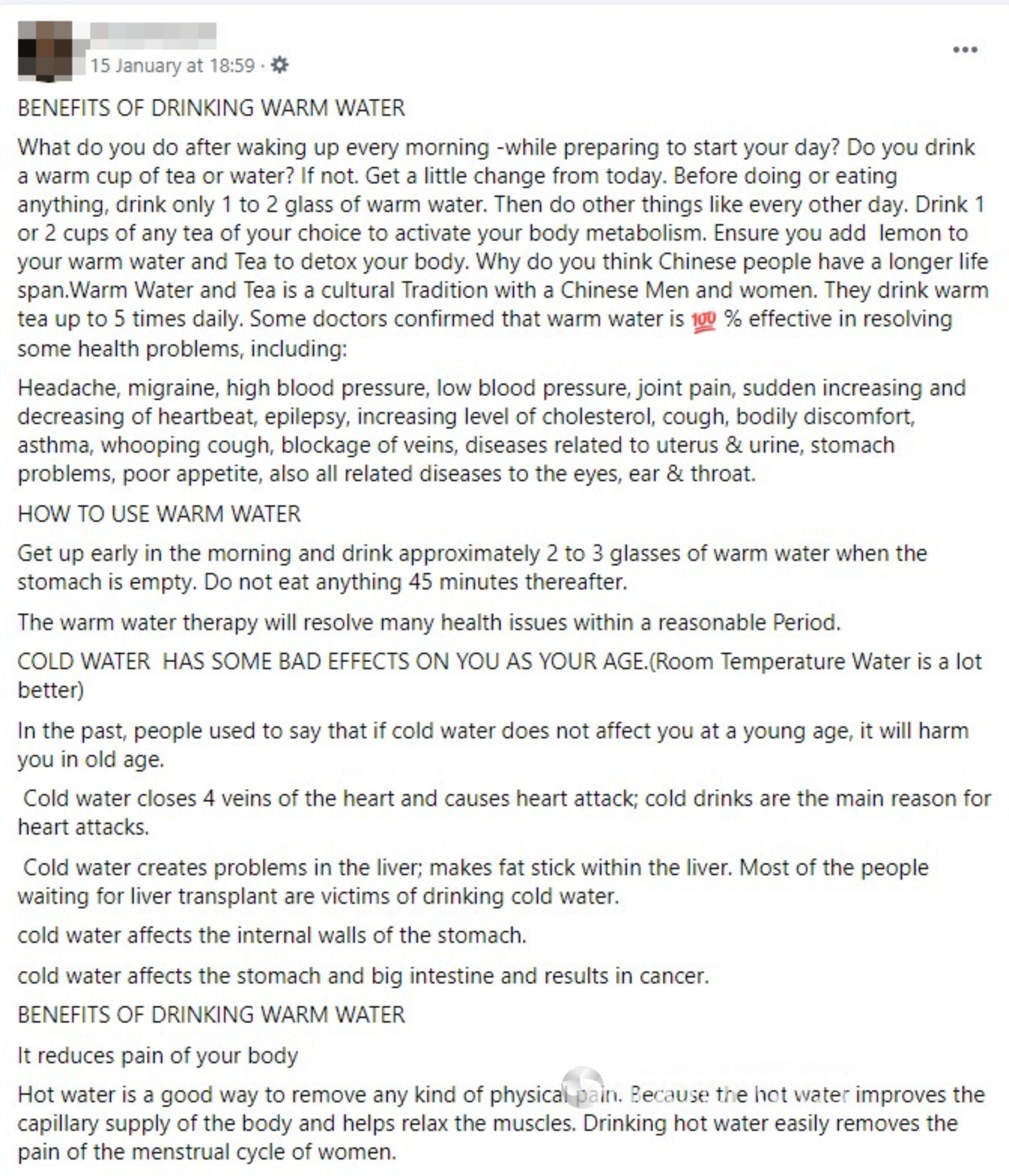The Statement
A Facebook post claims drinking cold water can cause cancer and heart attacks.
The January 15 post, shared by Fijian users, makes several claims regarding the health effects of drinking cold water, including that it “closes 4 veins of the heart and causes heart attack; cold drinks are the main reason for heart attacks” and “affects the stomach and big intestine and results in cancer”.
It goes on to claim that, conversely, drinking warm water is “100 per cent effective in resolving some health problems, including high blood pressure, low blood pressure, sudden increasing and decreasing of heartbeat, epilepsy, whooping cough, also all related diseases to the eyes, ear & throat”, amongst other benefits.
Variations of the post’s claims have been shared widely around the world, including in Nigeria and Zambia.

The Analysis
Drinking cold water will not cause heart attacks or lead to cancer in the stomach and intestines, according to experts.
Variations of the claim that drinking cold water leads to similar potentially deadly outcomes have circulated on the internet since at least 2006.
Water is an essential part of sustaining human life, assisting the body with hydration, digestion, absorption of nutrients, movement and regulation of temperature, the Australian government’s healthdirect website says.
Dr Yutang Wang, a lecturer in life sciences and a specialist in cardiovascular diseases from Federation University, told AAP FactCheck there are no scientific studies to support claims that drinking cold water will close the heart’s veins, causing heart attacks.
“The main underlying reason for heart attack is plaque (atherosclerosis) build-up in the arteries. When the dislodged plaque gets stuck in an artery and blocks the supply of blood to the heart, a heart attack occurs,” he said in an email.
The Heart Foundation says the most common cause of heart attacks is coronary heart disease, which stems from the build-up of plaque. Risk factors include unhealthy eating, being overweight or physically inactive, and smoking, as well as age, gender and family history.
Other causes of heart attacks include severe spasms in the coronary artery or tearing of the artery wall.
“Heart attacks can be triggered by many sudden stress situations including anger, heatwave, intense physical activity, infection, and others. However, drinking cold water has not been reported to be a trigger for heart attack,” Dr Wang said.
A spokesperson for the Heart Foundation told AAP FactCheck in an email that the organisation was not aware of a substantive body of evidence that showed drinking cold water could cause heart attacks.
One case report published in the US National Institute of Health’s National Library of Medicine details the death of a 12-year-old boy from cardiac arrhythmia – as distinct from a heart attack – after quickly ingesting a frozen slurry.
Dr Wang said that while rapid ingestion of a frozen drink could potentially be a trigger for heart problems, the incident rate was very low.
For the claim that drinking cold water leads to cancer, Clare Hughes, the chair of Cancer Council Australia’s physical activity and nutrition committee told AAP FactCheck there is no evidence that drinking cold water increases your risk of cancer, including stomach and intestinal (bowel) cancer.
“While there has been no evidence linking cancer to water consumption generally, there is some evidence that consuming hot liquids (e.g. beverages, soups and broths) above 65C probably increases the risk of oesophageal cancer because it can irritate the oesophageal lining,” Ms Hughes said in an email.
“The contribution that drinking very hot liquids makes to Australia’s oesophageal cancer rates is not clear. This advice is not specific to water but all hot liquids above 65C.”
Luigi Fontana, a professor of medicine and nutrition from the University of Sydney, told AAP FactCheck that he was not aware of any studies that showed drinking hot water was effective in preventing or treating any condition – although there were clear benefits in drinking water in general.
“(In relative terms), drinking water is much better than drinking soda or juice fruits for the prevention of obesity and related chronic diseases,” Prof Fontana said in a phone interview.
Variations of the cold and warm water claims have been debunked here and here.
The Verdict
There is no evidence to support the claim that drinking cold water will cause the heart’s veins to close, leading to a heart attack, health experts told AAP FactCheck.
Experts also say there is no evidence linking the consumption of cold water to the development of cancer in the stomach or the bowel, nor is there substantive research to show drinking warm water has relative health benefits.
False – Content that has no basis in fact.
* AAP FactCheck is an accredited member of the International Fact-Checking Network. If you would like to support our independent, fact-based journalism, you can make a contribution to AAP here.
All information, text and images included on the AAP Websites is for personal use only and may not be re-written, copied, re-sold or re-distributed, framed, linked, shared onto social media or otherwise used whether for compensation of any kind or not, unless you have the prior written permission of AAP. For more information, please refer to our standard terms and conditions.


















